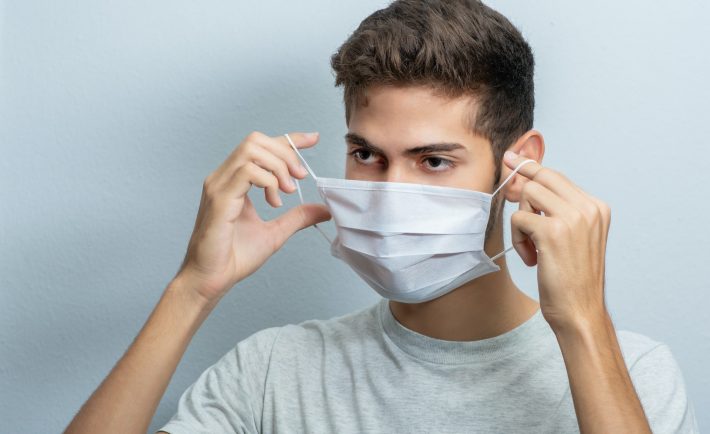Masks play a vital role in reducing the spread of COVID-19. However, prolonged wearing of masks can cause skin irritation and acne for individuals with sensitive skin. Maskne or Acne mechanica has never been a problem of ours with the exemption of healthcare professionals who have been wearing masks on their hospital duties. These healthcare professionals can attest to this irritating skin problem that has become more widespread among the general population.
Dr. Harry Dao, a dermatologist for Loma Linda University Health, explains what Maskne is.
“Masks impose heat, friction and occlusion on the skin and when combined with a moist environment from breathing, talking or sweating, this is a recipe for breakouts,” he says. The three main ways masks can cause breakouts are thru friction, occlusion, and irritation. Firstly, masks impose friction and chafing. The areas most at risk for breakouts are the bridge of the nose and behind the ears.
Secondly, pores get clogged and can become acne cysts or pimples. Your breath trapped beneath the mask makes the skin surface warm and moist. This environment can lead to a breakout called folliculitis, which happens when yeast or bacteria infect hair follicles.
Lastly, the material of a mask absorbs the skin’s natural oils. This leads to dryness and sensitivity for some people. When irritation becomes inflammation, you will see redness, dry patches, peeling, or dark marks. Acne is not the only skin condition reported by mask wearers. Other common skin problems include Seborrheic dermatitis, Rosacea, and Allergic contact dermatitis.
WAYS TO PREVENT SKIN PROBLEMS CAUSED BY MASK WEARING
1. Wash your face. It goes without saying that washing your face with a gentle cleanser and rinsing it with lukewarm water can help prevent dirt and oil from being trapped on the skin’s surface. Do this before and after you put your mask on.
2. Do not apply makeup. Who will see your entire face anyway? Wearing makeup under a mask causes clogged pores and breakouts. Makeup residue will also soil your mask.
3. Apply moisturizer. The moisturizer will not only act as a barrier between your face and your mask but, it will also keep your skin hydrated. This can reduce friction. Apply moisturizer onto a cleansed face before and after wearing a mask.
4. Wash your mask regularly. If you are wearing a cloth mask, ensure that you wash it after using. Otherwise, the dirt can become a breeding ground for bacteria. Choose a fragrance-free laundry soap because fragrances can irritate your skin.
5. Do not reuse surgical masks. Surgical masks are not meant to be reused. Throw it after using
6. Protect your ears. Elastic strap loops on the mask can cause friction burns on the back of your ears. If your skin is sensitive or if you will be wearing a mask for a long period of time, use ear savers. You can attach the straps on the ear savers’ buttons. You can buy yours from Lazada or Shopee.
When should you see a doctor?
If you have breakouts or skin damage that do not respond to skin care changes, you should see a dermatologist. Spreading redness or draining pus can be signs of infection too. Seek immediate medical attention, if this happens.

Image Credits: unsplash.com

